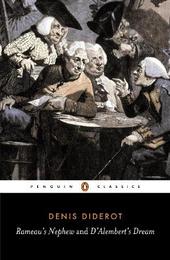
|
Rameau's Nephew / D'alembert's Dream
Paperback / softback
Main Details
| Title |
Rameau's Nephew / D'alembert's Dream
|
| Authors and Contributors |
By (author) Denis Diderot
|
|
Translated by Leonard Tancock
|
| Physical Properties |
| Format:Paperback / softback | | Pages:240 | | Dimensions(mm): Height 198,Width 129 |
|
| Category/Genre | Classic fiction (pre c 1945) |
|---|
| ISBN/Barcode |
9780140441734
|
| Classifications | Dewey:848.509 |
|---|
| Audience | |
|---|
|
Publishing Details |
| Publisher |
Penguin Books Ltd
|
| Imprint |
Penguin Classics
|
| Publication Date |
29 July 1976 |
| Publication Country |
United Kingdom
|
Description
Two of Diderot's most dazzling and radical texts One of the key figures of the French Enlightenment, Denis Diderot was a passionate critic of conventional morality, society and religion. Among his greatest and most well-known works, these two dialogues are dazzling examples of his radical scientific and philosophical beliefs. In Rameau's Nephew, the eccentric and foolish nephew of the great composer Jean-Philippe Rameau meets Diderot by chance, and the two embark on a hilarious consideration of society, music, literature, politics, morality and philosophy. Its companion-piece, D'Alembert's Dream, outlines a material, atheistic view of the universe, expressed through the fevered dreams of Diderot's friend D'Alembert. Unpublished during his lifetime, both of these powerfully controversial works show Diderot to be one of the most advanced thinkers of his age, and serve as fascinating testament to the philosopher's wayward genius.
Author Biography
Denis Diderot was born at Langres in eastern France in 1713. After graduating in Paris in 1732, he was nominally a law student for ten years, but was actually leading a precarious bohemian but studious existence. In the early 1740s he met three contemporaries who were of great significance to him and to the age- a'Alembert, Condillac and Rousseau, who assisted Diderot in the compilation of the Encyclopedie, which he worked on until its completion in 1773. Interested in the mind-body dichotomy, his work was a bold mixture of science and philosophy. He died in 1784. Leonard Tancock was a Fellow of University College, London and translated numerous texts for the Penguin Classics until his death in 1986.
|